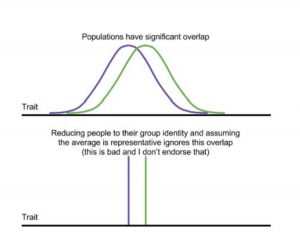Latest News
Google Fires Author of Google’s Ideological Echo Chamber

James Damore, who worked as a software engineer in Alphabet Incorporated’s Google, published a memo last week regarding anti diversity and gender stereotypes in the tech world and within the company, in Google’s internal forum. The memo, which went viral, is a 10 page long screed titled Google’s Ideological Echo Chamber.
In the memo, Damore argues that women are underrepresented in the tech industry not because they face bias and discrimination in the workplace, but because of inherent psychological differences between men and women. He claims that women have biological issues that have prevented them from being as successful in the tech industry as men. He also adds, “We need to stop assuming that gender gaps imply sexism,” and women are less interested in high stress jobs because they are more anxious. The memo includes graphs and charts to support his personal opinion and accuses Google of silencing conservative political opinions.


The memo, which spread outside the company as well, angered many in Silicon Valley including several Google employees who railed against its assumptions. Google’s Chief Executive Officer, Sundar Pichai also sent a company wide memo claiming portions of the memo had violated the code of conduct and crossed the line “by advancing harmful gender stereotypes in our workplace.” But, he also noted that the memo did raise some important and valid points, such as the need for more willingness at Google to include more points of view, including the more conservative ones. Google’s Head of Diversity Danielle Brown, speaking about the memo said, “It’s not a viewpoint that I or this company endorses, promotes or encourages.”
Bloomberg reported, James Damore was fired on Monday because of the memo and confirmed by Damore himself who said he was fired for, “perpetuating gender stereotypes.” The memo put Google in a no win situation as they have long promoted a culture of openness with employees, who have even mocked the company’s strategies on internal forums. Google has also been dealing with the criticism that it has not done enough to promote diversity in the tech industry. The search giant is currently also fighting a lawsuit against the U.S Department of Labor who claim the company systemically discriminates against women.
To clarify matters further, Sundar Pichai has also called for a townhall meeting, along with the members of the leadership team, this Thursday.
Latest News
D2C Brand Neeman’s Raises $4 Million for Tier 2/3 Store Expansion & Eco-Friendly Shoes

Hyderabad, January 13, 2026 Neeman’s, India’s leading D2C footwear brand famed for sustainable shoes and patented PIXLL® technology, has raised $4 million from existing investors. This funding boosts its cumulative capital past $10 million since 2015, with a post-money valuation nearing $50 million. CEO Vijay Chahoria emphasized offline retail as the “next frontier,” planning 50+ new stores in Tier 2/3 cities like Jaipur and Lucknow to blend eco-friendly innovation with hands-on customer experiences.
In India’s booming D2C ecosystem where footwear sales hit ₹1.2 lakh crore in 2025 Neeman’s targets hybrid retail amid high online CAC and 25-30% returns. Backed by vegan, machine-washable shoes priced ₹2,000-4,000, the brand leverages PIXLL® (5x more breathable than leather) for carbon-neutral comfort. Recent 5x revenue growth to ₹100 crore ARR, 1M+ pairs sold via Myntra and stores, and awards at India D2C Summit 2025 position it ahead of rivals like Paaduks.
Neeman’s offline expansion India eyes the $15B sustainable footwear market by 2028, fueled by PLI schemes, Gen Z’s 70% eco-preference (Nielsen), and Southeast Asia exports. Challenges like real estate costs are offset by data-driven inventory and omnichannel QR tech. Watch for Q1 2026 launches in Hyderabad and Bengaluru redefining D2C success through authentic, “Wear the Change” branding.
Latest News
Centre Mulls Revoking X’s Safe Harbour Over Grok Misuse

The Centre is weighing the option of revoking X’s safe harbour status in India after its AI chatbot Grok was allegedly misused to generate and circulate obscene and sexually explicit content, including material seemingly involving minors. The IT Ministry has already issued a notice to X, directing the platform to remove unlawful content, fix Grok’s safeguards, act against violators, and submit a detailed compliance report within a tight deadline. If the government finds X’s response inadequate, it could argue that the platform has failed to meet due‑diligence standards under Indian law, opening the door to harsher action.
Under Section 79 of the IT Act, safe harbour protects intermediaries like X from being held directly liable for user‑generated content, provided they follow due‑diligence rules and promptly act on legal takedown orders. Revoking this protection would mean X and its officers could be exposed to criminal and civil liability for obscene, unlawful, or harmful content that remains on the platform, including AI‑generated images from Grok. This prospect significantly raises X’s compliance risk in India and could force tighter moderation, stricter AI controls, and more aggressive removal of flagged posts.
The Grok episode also spotlights the regulatory grey zone around generative AI, where tools can create harmful content at scale even without traditional user uploads. Policymakers are increasingly questioning whether AI outputs should still enjoy the same intermediary protections as conventional user posts, especially when they involve women and children. How the government ultimately proceeds against X over Grok misuse could set a precedent for AI accountability, platform responsibility, and safe harbour interpretation in India’s fast‑evolving digital ecosystem.
Latest News
How Pronto Is Redefining 10-Minute Home Services in India with a $25 Million Fundraise

Home services startup Pronto is in advanced talks to raise about $25 million at a near-$100 million valuation, underscoring strong investor confidence in India’s fast-growing 10-minute home services market. This potential round would be the company’s third major funding milestone after its $2 million seed and $11 million Series A in 2025, backed by marquee investors such as General Catalyst, Glade Brook Capital, Bain Capital and new participant Epiq Capital. The fresh capital is expected to further strengthen Pronto’s positioning as a leading tech-led household help platform for urban consumers.
Pronto operates a 10-minute on-demand home-services platform that connects users with trained, background-verified workers for everyday tasks like sweeping, mopping, utensil cleaning, laundry and basic cooking. Using a hub-and-spoke, shift-based model, the startup stations workers at hyperlocal hubs, enabling sub-10-minute fulfilment and more predictable earnings compared to the informal domestic-help market. Founded in 2024 by Anjali Sardana and based in Delhi NCR, Pronto has already expanded from Gurugram into major cities such as New Delhi, Mumbai, Bengaluru and Pune, and is handling around 6,000 daily bookings with nearly 1,300 active professionals as of December 2025.
The upcoming $25 million fundraise is expected to be used to enter more metros, deepen presence in existing neighbourhoods with additional hubs and upgrade Pronto’s technology for smarter routing, shift planning and real-time operations. A significant portion of the capital will also go into training, retention and benefits for its workforce to maintain consistent service quality at scale, especially as competition heats up from rivals like Snabbit and Urban Company in the rapid home services space. This near-$100 million valuation not only validates Pronto’s model but also highlights a broader shift toward organised, tech-driven domestic-help solutions in India’s largely informal home-services market.













Code of destiny
April 17, 2025 at 12:02 am
I’m really inspired together with your writing skills and also with the layout for your weblog. Is that this a paid subject or did you customize it yourself? Anyway keep up the nice quality writing, it’s rare to peer a nice blog like this one these days!
iwin
November 6, 2025 at 8:04 am
iwin – nền tảng game bài đổi thưởng uy tín, nơi bạn có thể thử vận may và tận hưởng nhiều tựa game hấp
MM88
November 7, 2025 at 4:04 am
Với giao diện mượt mà và ưu đãi hấp dẫn, MM88 là lựa chọn lý tưởng cho các tín đồ giải trí trực tuyến.
谷歌外推
November 10, 2025 at 4:27 am
采用高效谷歌外推策略,快速提升网站在搜索引擎中的可见性与权重。谷歌外推
J88
November 10, 2025 at 6:42 am
Đến với J88, bạn sẽ được trải nghiệm dịch vụ cá cược chuyên nghiệp cùng hàng ngàn sự kiện khuyến mãi độc quyền.
Kuwin
November 13, 2025 at 5:47 pm
kuwin sở hữu kho game đa dạng từ slot đến trò chơi bài đổi thưởng, mang đến cho bạn những giây phút giải trí tuyệt vời.
GO88
November 19, 2025 at 9:51 pm
Tham gia cộng đồng game thủ tại Go88 để trải nghiệm các trò chơi bài, poker phổ biến nhất hiện nay.
MM88
November 29, 2025 at 7:35 pm
Khám phá thế giới giải trí trực tuyến đỉnh cao tại MM88, nơi mang đến những trải nghiệm cá cược thể thao và casino sống động.
chanced casino
December 18, 2025 at 12:58 pm
chanced casino chanced casino
onlinecasino
January 31, 2026 at 8:30 pm
Corner goals, headed and volleyed finishes from set pieces